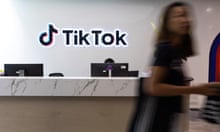The EU’s executive body has banned its thousands of staff from using TikTok over cybersecurity concerns, a decision the Chinese-owned social video app has criticised as “misguided” and based on “fundamental misconceptions”.
The European Commission sent an email to employees ordering them to delete the app from all work phones and devices, and any personally owned ones that use the commission’s apps and email. Employees have until 15 March to comply.
A spokesperson said: “This measure aims to protect the commission against cybersecurity threats and actions which may be exploited for cyber-attacks against the corporate environment of the commission. The security developments of other social media platforms will also be kept under constant review.”
The commission said it had enacted the ban in line with its “strict internal cybersecurity policies” and longstanding advice to staff to “apply best practices when using social media platforms and keep high-level of cyber awareness in their daily work.
“It is therefore our duty to respond as early as possible to potential cyber alerts,” the spokesperson said.
ByteDance, the privately owned parent company of TikTok, has denied there were any data security concerns related to its products and said it wanted to “set the record straight” with the commission.
“We are disappointed with this decision, which we believe to be misguided and based on fundamental misconceptions,” said a spokesperson for TikTok. “We have contacted the commission to set the record straight and explain how we protect the data of the 125 million people across the EU who come to TikTok every month.”
ByteDance said it was continuing to strengthen its approach to security, including recently announcing the establishment of three new datacentres in Europe to ensure users’ information was stored locally and not exported to foreign jurisdictions, such as China.
The company is also reducing employee access to data – an internal report released by ByteDance in December found that four employees violated policies by inappropriately accessing data on TikTok users in the US – and “minimising data flows outside of Europe”.
Governments and officials in Europe and the US have taken similar steps to the commission to limit use of the app by employees amid fears that data may be accessed by Beijing.
after newsletter promotion
Last summer, a lobbying campaign by Conservative MPs resulted in the closure of the @ukparliament TikTok account.
In the US, TikTok has been banned on all federal government devices, and most US states have imposed similar bans. Other countries including the Netherlands are assessing whether to implement restrictions on government employees using TikTok.










